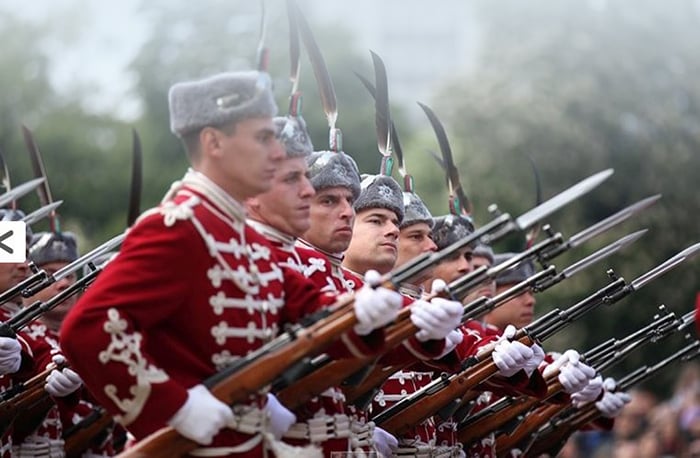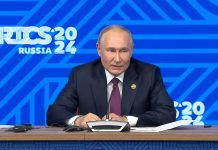
By Mihail Naydenov, for Bulgaria Analytica
Hybrid war is not declared. It is being fought, instead. This is the essence of the strategy of today’s actors, be they state or non-state, in their aggressive hybrid warfare campaigns. The countries under attack are quite often unable to understand what is really happening on the ground until it might be too late.
Since the end of the Cold War Russia has been pursuing an intended and calculated policy of keeping enough influence in Bulgaria to have control over national decisions. It has achieved this objective primarily through economic tools as well as by actively exploiting a large inherited network of personal connections and dependencies formed during the Communist era. After the ascent of Vladimir Putin, Russian subversive activity in Bulgaria has gained a renewed focus, including in defense. It became particularly acute following the annexation of Crimea.
Together with the economic, energy, political and information tools that Russia uses in its bid to achieve an enduring “state capture” in Bulgaria, defense subversion serves as another critical enabler of Moscow’s strategy. Defense subversion in this case means efforts aimed at negatively influencing national defense policy decisions that result in capability degradation of the Armed Forces and preventing their effective build-up.
The Russian strategy is aimed at exercising control in Bulgaria to such an extent that Sofia cannot pursue a truly sovereign foreign and security policy as a full-fledged NATO and EU member. The essence of this strategy can be defined as “Bulgaria: Trojan Horse” in NATO and the EU. It is named after a cynical remark of the Russian permanent representative to the EU Vladimir Chizhov in 2006, who called Bulgaria the Russian “Trojan Horse in the EU”. Under this logic, Sofia would be permitted to formally join the EU and NATO, but on the condition that Moscow would have a sufficient level of control over its policy direction. Consequently, the Bulgarian membership would be seen by Moscow as an asset rather than a threat.
Defense is a distinct and important target of Russian subversion as Moscow acts across the full spectrum of power in its hybrid war against Sofia. A weak national defense means Bulgaria will be a security burden to NATO, rather than a security provider. A Bulgaria that ‘free rides’ off its allies’ defense guarantees perfectly serves Moscow’s aims of weakening, dividing and eventually disrupting the Alliance.
Fueling division in society and among the main political parties and leaders with regard to NATO membership has been a long-lasting element of Russian influence. In this context, the implementation of the national commitments to the Alliance is under attack. Going further, some politicians even float the idea of a referendum on NATO and EU membership. This logic is aimed at subverting the foundations of the Bulgarian foreign, security and defense policy as a member of NATO and the EU. This is why the Kremlin supports anti-Western, Euroskeptic, pseudo-nationalist and pro-Russian parties hoping that they one day gain a stake in defense decision-making.
To stimulate mistrust of NATO, Moscow has consistently manipulated media and public opinion by using information operations. Aggressive pro-Russian propaganda targets Bulgarian defense policy, actively carried out by local proxies. Defense-focused web sites and social media are actively used to cultivate nostalgia amongst retired military personnel and its reservist NGOs, and to disseminate pro-Russian propaganda. A visible example of a web site of such a nature is pan.bg.
Analyzing pro-Russian propaganda, some recent main manipulative themes can be pointed out – NATO and Bulgaria are preparing to go to war with Russia, Bulgarian soldiers will never fight Russians, Russian weapons are superior, just to name a few. Moreover, the participation in NATO-led operations and the build-up of allied infrastructure, in particular the Bulgarian-American joint military facilities, have traditionally been targets of anti-NATO propaganda serving Russian purposes.
As striking recent example that can be given is the fully fake news that during the NATO exercise Noble Jump – 2017 in Romania in June there were targets with symbols that strongly resembled Russian insignia and that Bulgarian commanders and soldiers had refused to obey orders and open fire at these targets. Hence the manipulatively implied conclusion is that the Bulgarian military will never go to war with Russia and therefore that Bulgaria is not a dependable NATO ally.
The false narrative that NATO is preparing to attack Russia also served the purpose of influencing public perceptions in Bulgaria. In 2015 there was fake media coverage on a fully invented “army mobilization” to go to war with Russia. Presenting the implementation of the NATO Wales and Warsaw Summits’ decisions as well as the joint exercises (Anaconda 2016) as deliberate preparations to start a war with Moscow is another telling example. Under this manipulatively distorted logic the efforts to boost national and allied defense are manipulatively presented as preparatory actions to initiate military aggression.
Even though the media outlets that presented these fake narratives are not recognized nation-wide as trustworthy and authoritative and they had in fact marginal coverage, their story was actively disseminated in social media, mainly Facebook. They have a permanent audience of people who can be easily manipulated with pro-Russian propaganda and it is easily and aggressively disseminated on Facebook. It is not so much their capacity that makes these outlets as successful as it is the ongoing lack of capability of national institutions to counter fake news and hybrid warfare propaganda.
Promoting nostalgic ideas, in particular the return to conscript army, serves the Russian subversion goals well, although this might not be directly attributable to Moscow now. Such ideas divert attention from the most pressing problems of the Bulgarian Armed Forces. They will lead to waste, if ever allowed to take place. The promotion of unrealistic defense visions also fits into the purpose of keeping the Bulgarian defense weak through fueling division and hence undermining transformation.
Preventing the strengthening of the NATO presence in the Black Sea is a distinct goal of Russian strategy. The information campaign on the so-called “NATO Black Sea flotilla” in June 2016 is a good example. The awkward reaction of the then country’s leadership sent a definitely negative signal to the Alliance that was certainly noticed and taken into consideration It caused a reverse of the initially gathered momentum for the initiative actively promoted by Romania. Russian pressure was for sure behind this reaction of the then government and then president, albeit there are still no direct proofs thereof. Nevertheless, the consequences are visible now, even in the policy of the present government, which is regrettably not active enough in seeking more NATO presence in the Black Sea, even though it is visible today that Russia is militarizing the Crimea and is building up its naval capabilities threatening the regional power balance.
The “Black Sea flotilla” story is representative of a long pursued line of security and defense policy of evading options leading to more substantial NATO presence in Bulgaria and in the region. This has long been a tool of preference for local actors serving Russian interests. This translates into a political line of behavior of being pro-NATO in words, but anti-NATO in deeds. This is the traditional policy course of the left-wing parties that have managed so far to gain the bulk of the nostalgic voters.
Sabotaging defense reform and leaders that promote transformation is the hardest to be proven to be explicitly Moscow-related. Nonetheless, it serves very well the Russian interest in keeping the defense system underperforming. Experience thus far shows that defense reforms have advanced too slowly, quite often with setbacks. Even though it is still not proven that Russian direct involvement is behind persistent legacy thinking in the Bulgarian defense system, it fits quite well in Russia’s interests. Legacy thinking is supporting the status quo, therefore prolonging the influence of established structures and dependencies. This actually could result also in “institution capture” causing further defense capability degradation. This capture could happen to be inadvertent, not openly stimulated by Russia, but it still serves Moscow’s strategy.
As a result of sabotaging genuine transformation and really reform-minded people, the legacy concepts and thinking still survive in the Bulgarian defense system. They are antithetical with the Western/NATO concepts and thus the organization is still unable to provide enough defense capabilities. This results in inability to produce realistic defense plans. Spending ambitions have never matched reality. This is a shared problem plaguing the new NATO member countries’ defenses. It is one of the gravest challenges to their institutions and is a major failure in Western provided advice and assistance.
Corruption and mismanagement are perfect system debilitating agents. Indeed, this is the hardest to be proven without Court sentences, resulting from the actions of truly independent and trusted Prosecution and Judiciary. Corruption and persistent bad management might not be necessarily orchestrated by Moscow, but they clearly fit in its ambitions. Pervasive local cultures of corruption and bad management practices in the ex-Communist countries are good breeding ground for influencing decisions in Moscow’s favor.
Another area of Russian interest is preventing multinational solutions with allies that build up the most deficient capabilities. As a good example here can be pointed out the efforts of people interested in the maintenance of the legacy Soviet aircraft to foment fears about the joint air policing mission with NATO allies, erroneously presented as a loss of capability and sovereignty. Once again efficiency and effectiveness is sacrificed to keep intact the interests of a vocal lobbyist group connected to the Air Force, interested in prolonging the Soviet MiG-29 fighter jets operation, and the interests of Russian and partner cash-hungry contractors.
Subverting defense modernization is one of the critical “battlefields” of Russian activity. As long as Soviet equipment is maintained at high expense, Moscow keeps a strong lever to influence national policy. Substantial money transfers to Russia for the repair and maintenance of the Soviet aircraft could create strong enough local interests not only to keep the old equipment as long as possible, but also to promote policy options that are favorable or at least not opposing Russian interests. Analyzing the most evident actions and tactics in undermining the Armed Forces’ modernization, the conclusion is that they very well serve the Russian subversion strategy. They certainly do it, regardless that there could be still not enough hard evidence that all of them are explicitly activated by Moscow.
Postponing defense acquisition and delaying ad infinitum key acquisition projects, such as the badly needed new type of NATO-interoperable multirole fighter aircraft, is the first notable example. Prolonging the maintenance of obsolescent Soviet weapons and equipment means to continue to pour money into Russian pockets in times of ongoing sanctions. A notorious example here is the spending of a part of the specially allocated for the Air Force modernization additional funds of 80 million BGN for the fiscal 2016. Instead of investing it in new type of fighter aircraft, 70 million BGN were consumed by the maintenance of a part of the MiG-29 jets. The most preferred solution serving the interests of the Kremlin is to give “eternal life” to the MiG-29 jets by continuing to sponsor the Russian defense industry, even beyond the end of their lifecycle in 2029.
If modernization finally takes place, the most probable subversive action supported by Russia would be promoting the idea of having at the same time in operation both a newly acquired NATO-interoperable aircraft and the MiG-29 jets (why not also the SU-25s?). This will be a financially devastating solution, making Bulgaria operate de facto two separate Air Forces, each requiring its own budget, logistics and personnel. This will prolong the status quo of keeping the Air Force the greatest consumer of capital expenditures, in comparison with the Land Forces and the Navy, whose modernization has been systematically underfunded so far. In fact, the most ill-funded Service with regard to acquisition, namely the Land Forces throughout the last 15 years, has provided the bulk of the national contribution to NATO and EU operations. Therefore the most effective contributor to allied operations has by default been left without the necessary funding for modernization, while the least productive Air Force, measured by the criteria of deployability and sustainability, has gotten thus far the lion’s share. This led to no substantial capability build-up and a great deal of the capital expenditure went to MiG-29 and other legacy aircraft (SU-25, Mi-24, Mi-17).
If the acquisition of new fighter aircraft is finally launched, the most promoted choice would be to buy a system that no one of neighboring NATO countries operates. This will prevent the development of multinational cooperation in maintenance, training and possibly operating, thus averting the opportunity of sharing costs at regional allied level. In this case the Bulgarian defense would end up having a stand-alone new aircraft, too costly to be effectively maintained and operated by the country itself.
Encouraging procurement decisions that do not cover the full life cycle is another possible subversion option. Even though they could not necessarily be caused by Russia, such solutions debilitate the Armed Forces and thus are favorable for Moscow’s strategy of keeping Bulgarian defense weak. This will lead to inevitable overspending in the future with regard to maintenance and possible long periods of non-functioning due to financial shortage and therefore capability deficiency.
Failure to prioritize capability requirements in times of expected continuous financial shortage is a local long-existing vulnerability that can be exploited by Russia. Encouraging procurement of systems that do not contribute to the buildup of the most necessary capability can be expected in the future. A telling example was the Bulgaria’s misguided decision to buy 12 “Cougar” transport helicopterseven while the Air Forces were badly in need of a new type of fighter aircraft (and still are). The procurement of systems that do not have all the needed equipment for the most probable missions can be pointed out as a variety of such a failure. The ordering of the “Cougar” helicopters without protective armor makes them useless in hostile environments, such as the NATO mission in Afghanistan. In this context, it is worth asking why money is still being overspent on obsolescent Soviet aircraft, instead of redirecting some of it to upgrade dt least some of the “Cougars”.
If acquisition of NATO-interoperable weapons and equipment takes place, the most palatable solution for Moscow would be to have the money spent on purchases that bring minimal capability of the Bulgarian Armed Forces. Following this logic, the most aggressively promoted choice would be to acquire systems that should be the least working solution given the most pressing needs of the Bulgarian defense. The right question here is whether the acquisition of the 12 “Cougar” transport helicopters was the most pressing necessity, given the ongoing lack of a new type of fighter jet. If similar mistakes happen in the future, the reliance on the obsolescent Soviet equipment will be prolonged and the Bulgarian Armed Forces will still be inoperable with NATO. Therefore, Bulgaria will continue to have a weak national defense with degrading capabilities.
The “Cougar” fiasco should serve as a warning bell for the years to come. The forthcoming choice of the new Armored Fighting Vehicles for the Land forces and new Navy vessels should be made very carefully and under enhanced parliamentary, public and even NATO scrutiny.
First and foremost, it is necessary to know whether the systems that would be selected are the right choice, given the strategic environment and the money available now and in the years to come not only for its acquisition, but also for its maintenance and operation till the end of its lifecycle. A key element for any informed decision is to strictly follow the NATO-shared vision that a defense capability is composed of eight integral elements, known under DOTMLPFI – Doctrine, Organization, Training, Materiel, Leadership and Education, Personnel, Facilities and Interoperability. Acquisition per se is not enough to bring about capability, as it is only a vehicle for having the component Materiel (M), while providing for the rest are needed comprehensive system efforts and a new way of thinking.
If new acquisition failures are admitted, instead of real defense capabilities, the defense would end up having platforms that are more of a liability rather than capability with added value. At this juncture Moscow would do its best to ensure that money spent do not result in the most needed solutions. A key facilitating factor in its quest to keep the Bulgarian defense organization underperforming would be to skillfully use its network of nurtured connections and dependencies, coupled with the natural human proclivity to extract personal profit at any price. Regardless of the variety of tactics that could be used, one permanent feature of any subversive action is the lack of transparency in acquisition.
All these negative developments make the defense organization unprepared to face the challenges of the 21st century, one of the greatest of which is the revanchist policy of Vladimir Putin’s Russia. That is why defense subversion must be urgently addressed both at the national and NATO and EU level. A good starting point is to raise awareness among society and the allies about this long-neglected critical problem.
Raising awareness is the first step to start with. Hybrid warfare is first and foremost about perceptions and understanding of the real situation. If leaders and society of any given country under hybrid attack are unable to comprehend they are under such a threat, then the defeat is only a matter of time. Nowadays this is the main challenge to be overcome in the case of Bulgaria. Having a clear vision on the current threats, their nature and their source is the first solid foundation for adopting and implementing a robust national strategy to counter hybrid threats.
By Mihail Naydenov, for Bulgaria Analytica
Mihail Naydenov is a defense and international security expert. He is a member of the Atlantic Council of Bulgaria. Mihail Naydenov has been a civilian expert at the Defense Policy Directorate of the Ministry of Defense of Bulgaria since 2001. He is experienced in defense policy formulation and implementation, analysis, speech-writing and conduct of Strategic Defense/Force Structure Reviews.




